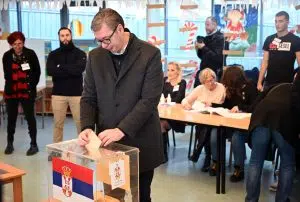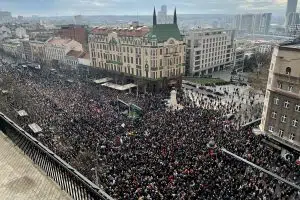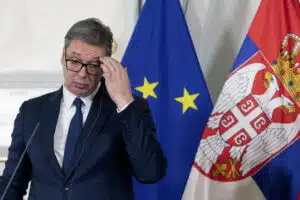Brussels – The back-and-forth between Brussels and Belgrade over the conduct of early elections in Serbia on December 17 continues, with a new item on the table: the final report from the OSCE (Organization for Security and Cooperation in Europe) on critical elements at the polls. “confirms concerns: the electoral process requires tangible improvement & further reforms. Reports of irregularities need to be addressed in a transparent manner, including those related to local elections,” European External Action Service (EEAS) spokesman Peter Stano said this morning (February 29).

The OSCE report released less than 24 hours ago confirms the alarm already anticipated by preliminary findings in December, particularly in terms of internal interference and unfair conditions for competitors of the ruling Serbian Progressive Party (SNS). “Although technically well-administered and offering voters a choice of political alternatives,” the 2023 early elections “were dominated by the decisive involvement of President” Aleksandar Vučić which, “together with the ruling party’s systemic advantages, created unjust conditions for contestants,” according to the OSCE report. In addition, although “Fundamental freedoms were generally respected in the campaign,”the vote was “marred by harsh rhetoric, media bias, pressure on public sector employees, and the misuse of public resources.” The vote was “marred by harsh rhetoric, bias in the media, pressure on public sector employees and misuse of public resources.” 
These indications re-open the game of what measures to take after the not completely transparent conduct of the early elections on Dec. 17. Only a few days ago, the incumbent Serbian Prime Minister Ana Brnabić, completely closed the door to an international investigation “because it would require the annulment of national sovereignty,” rejecting the European Parliament resolution that demanded serious measures from the EU Commission in case the involvement of authorities and the outgoing government in election fraud. These included a “suspension of EU funding on the basis of serious violations of the rule of law” and, as a result, a possible halt to accession negotiations: “They should only advance if the country makes significant progress in EU-related reforms.” In addition to the independent international investigation, MEPs also asked the Commission to launch “an initiative to send an expert mission to Serbia” following the example of the ‘Priebe reports’ (the recommendations of an expert group commissioned by the Commission in 2015 on North Macedonia).
“There is no time to waste” on the implementation of the OSCE’s 25 recommendations “with a view to future elections in the country,” EEAS spokesman Stano said to the authorities in Belgrade, referring to “international obligations and standards for democratic elections.” Key recommendations include the need to “revise legislation to effectively address” shortcomings regarding “an inclusive consultative process based on broad political consensus,” the introduction of “standardized mandatory training for all local electoral commission and polling board members,” and the development of “a timely, comprehensive and targeted voter education program,” including “prevention of group voting and the importance of voting by secret ballot.” The OSCE also recommends “a meaningful audit of the voter and civil registers” and the adoption of measures to “prevent misuse of office and state resources,” at the same time implementing “effective legal and institutional oversight mechanisms to prevent intimidation and pressure on voters, including employees of public and state institutions.”
Tensions in Serbia after early elections
.

Serbian opposition protests in Belgrade (credits: Miodrag Sovilj / Afp)
Despite high expectations on the eve of the polls from the ‘Serbia Against Violence’ coalition, the Serbian Progressive Party won again in early elections with 46.67 percent of the vote, trailing by 23 percentage points the very united opposition that came in second place. In the face of the fraud and numerous illegal actions at the ballot box, thousands of people protested, responding to the call of parties and movements that had translated into political (pro-European) demands the street protests against the climate that led to the May Shootout. The Organization for Security and Cooperation in Europe (OSCE)-led election observation mission – in which members of the European Parliament also participated – also noted “the misuse of public resources, the lack of separation between official functions and campaign activities, as well as intimidation and pressure on voters, including cases of vote-buying.” Nearly a month after the early elections, protests against fraud by the ruling party continued, particularly in Belgrade.
In the capital, the situation remains tense, and the possibility of a repeat of the local elections, the victory of which was claimed by the Serbian Progressive Party, cannot be ruled out: the party led in Belgrade by the pro-Russian Aleksandar Šapić won 49 seats (out of 110), which, however, would not be enough to control the City Assembly with the support of the far-right Russophile nationalist party ‘We, the Voice of the People’ of Branimir Nestorović alone. The coalition ‘Serbia Against Violence’ denounced that over 40 thousand people arriving from Republika Srpska (the Serb-majority entity of Bosnia and Herzegovina) voted in Belgrade without being formally registered as residents and demanded the annulment of the ballot result, explicitly speaking of “electoral theft.” The same complaint came from MEP and member of the parliamentary delegation Viola von Cramon-Taubadel (Greens/Ale): “We have seen cases of organized transportation of voters from Republika Srpska and intimidation of voters.”

Serbian President Aleksandar Vučić (credits: Alex Halada / Afp)
In addition, there is the case that Brussels “is following closely” (words of the EU Commission’s spokeswoman for Neighborhood Policy and Enlargement, Ana Pisonero) over the violence suffered by the leader of the opposition Republican Party, Nikola Sandulović, who was picked up by Serbian intelligence services on Jan. 3 and severely beaten in detention for paying homage at the grave of Adem Jashari, one of the founders of the Kosovo Liberation Army (UCK). Members of the Serbian Security Information Agency (BIA) allegedly abducted and tortured Sandulović and then detained him in Belgrade’s central prison without access to independent medical care. Those responsible for the violence included Milan Radoičić, deputy head of Lista Srpska (the main party representing the Serb minority in Kosovo and closely controlled by President Vučić), who, among other things, has already admitted to organizing the armed attack in northern Kosovo in late September last year. The former head of Serbian intelligence (who resigned two months ago), Aleksandar Vulin, reportedly personally ordered Sandulović’s arrest, but the defense lawyer pointed the finger at President Vučić.
Find more insights on the Balkan region in the newsletter BarBalcani hosted by Eunews
English version by the Translation Service of Withub










